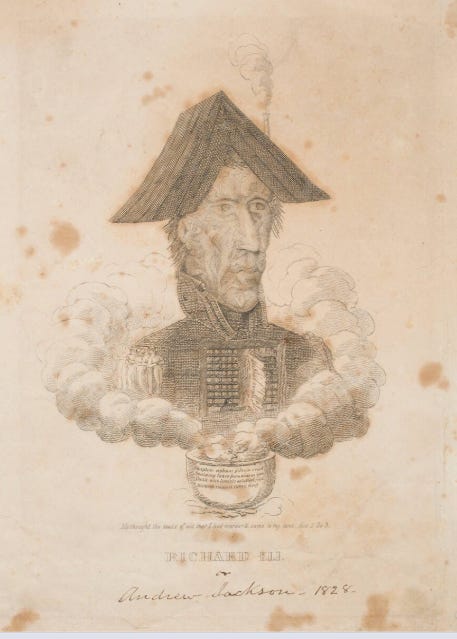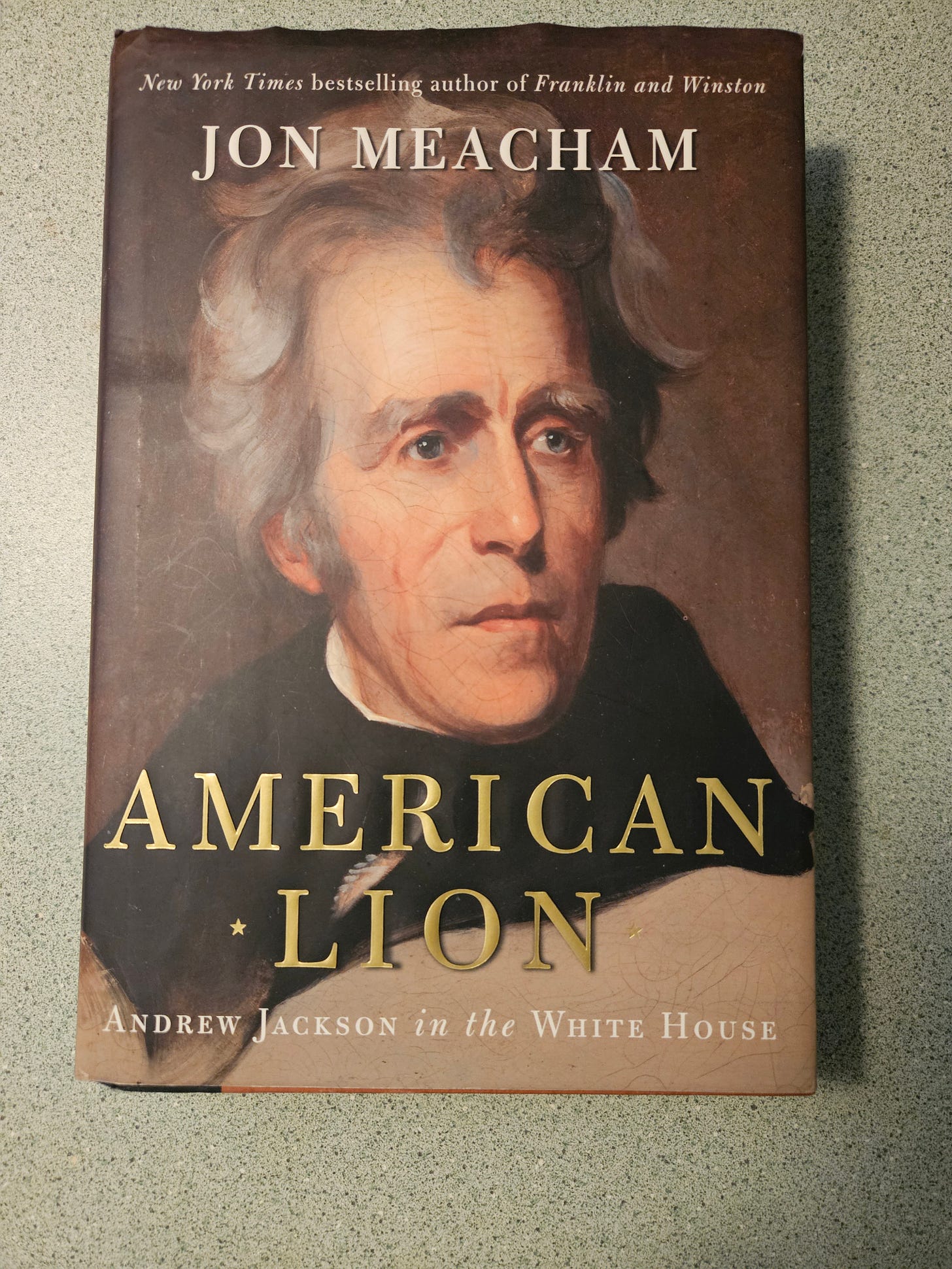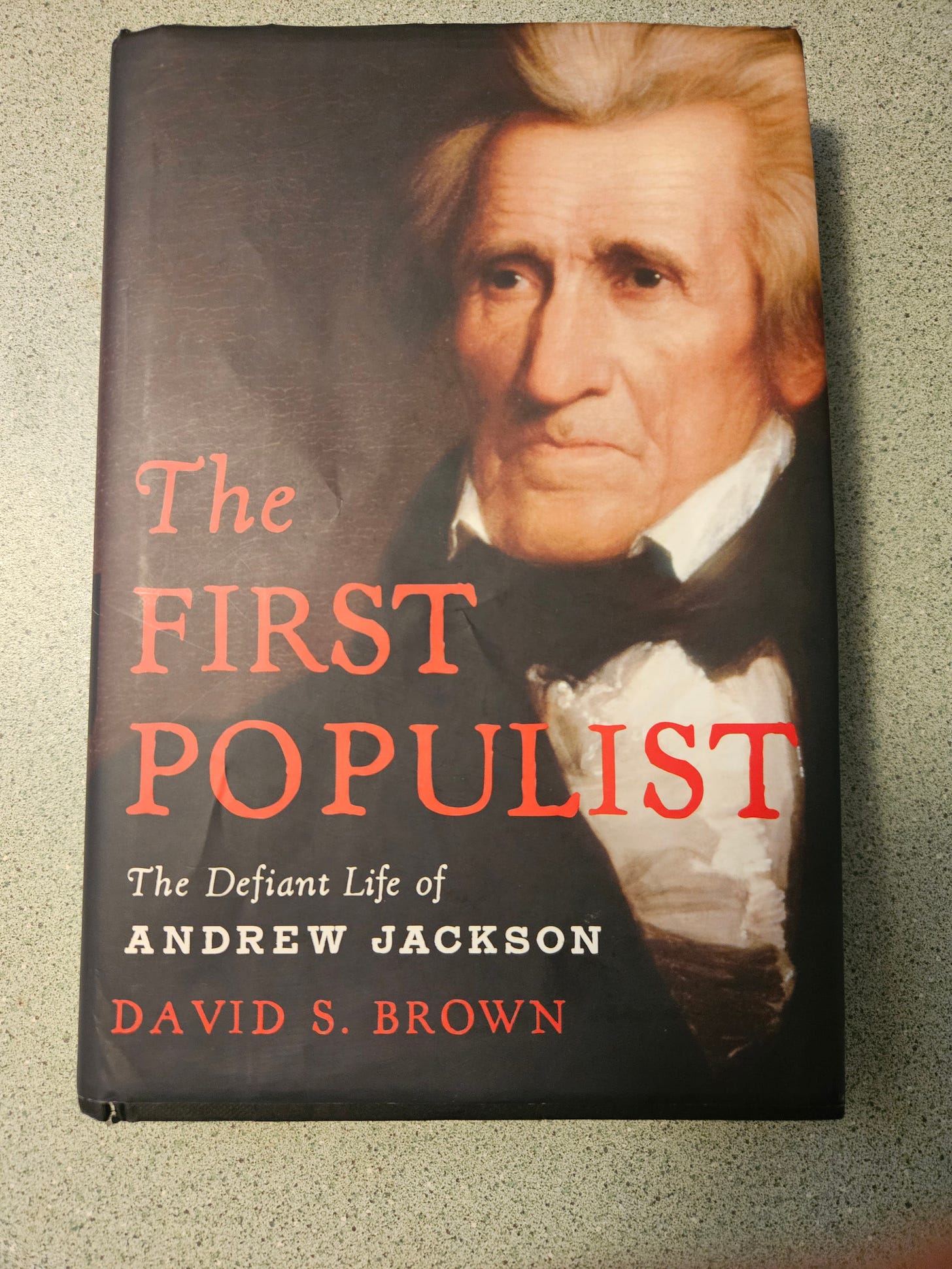I picked two books to read for the seventh American president, Andrew Jackson. From online book discussions about presidential biographies, I knew that this president was known to be controversial and, in the words of many that I read, terrifying. In learning about both the life and times of Jackson, I believe the drawing of Jackson below is symbolically fitting. From afar the picture may seem normal and even nostalgic (e.g., campaign barbecues, dueling, whiskey and tobacco), but when you begin to take a closer look you realize the atrocities that many in the society endured during his time in power.

I chose two books to read about Jackson, American Lion by Jon Meacham and The First Populist: The Defiant Life of Andrew Jackson by David S. Brown.
American Lion: Andrew Jackson in the White House by Jon Meacham
Not only had I read many positive reviews about about American Lion by Jon Meacham, but I also happened to find a great deal on it at a used book store in my neighborhood for about $3.50. I found the book to be very easy to read. Much of it focused on the scandal that Jackson faced during his presidency due to the alleged adultery of Peggy O’Neal, the wife of John Eaton, Jackson’s Secretary of War.
Peggy O’Neal’s first husband was John B. Timberlake, a purser in the navy who was thought to have committed suicide. Peggy O’Neal married John Eaton soon after Timberlake’s death, and the rumor mill suggested that she had been involved with Eaton prior to Timberlake’s death and this was the reason for her husband’s suicide.
Jackson faced the wrath of this scandal during his presidency, receiving feedback from both religious figures of the time as well as having fall outs with members of his own family. Some stated in reviews of American Lion that the book focused too much on the rumors of society at the time, however I found this focus on rumors demonstrated how much reputation meant to the society that Jackson lived in as well as the importance of it in his own life.
Jackson had dealt with a scandal of his own when he married his wife Rachel Donelson, who did not realize that her divorce with her first husband had not been finalized at the time she married Jackson. During his campaign for presidency, Jackson and his wife faced allegations of bigamy and adultery. Rachel died days after he was elected in 1828, and Jackson attributed her death to the stress due to the scrutiny she faced during the campaign. Her epitaph on the grave she shares with Jackson speaks to this:

“Here lie the remains of Mrs. Rachel Jackson, wife of President Jackson, who died December 22nd 1828, aged 61. Her face was fair, her person pleasing, her temper amiable, and her heart kind. She delighted in relieving the wants of her fellow-creatures, and cultivated that divine pleasure by the most liberal and unpretending methods. To the poor she was a benefactress; to the rich she was an example; to the wretched a comforter; to the prosperous an ornament. Her piety went hand in hand with her benevolence; and she thanked her Creator for being able to do good. A being so gentle and so virtuous, slander might wound but could not dishonor. Even death, when he tore her from the arms of her husband, could but transplant her to the bosom of her God."
The First Populist: The Defiant Life of Andrew Jackson by David S. Brown
For the second presidential pick about Andrew Jackson, I chose The First Populist: The Defiant Life of Andrew Jackson by David S. Brown. I was specifically interested in this book because it discussed the idea of populism and how Jackson lived up to this label. If you look at Jackson’s presidency with the modern definition of democracy, you would clearly reject his being a president for the people. However, considering that Jackson lived in a time when the people, as in eligible voters, were white males, he did seem to stand for who he perceived as the average person at the time.
Though Jackson was considered an aristocrat at the time of his election, he grew up as an orphan and worked his way up through military service and work as a lawyer as well as some family connections. In reading about Jackson, he did seem to remember where he came from in terms of social status once he was elected to the presidency. He worked for what he saw as the common man when he opposed the National Bank, which he deemed corrupt, favoring the elite, and placing too much power in the hands of the few.
Populism Today
It is interesting to contrast the populism of Jackson’s time period with the Make America Great Again movement of today, which embraces populist rhetoric but when you look closely at the policies they support, it seems to me that they stand for putting the economic power in the hands of the few, the opposite of Jackson’s stated mission. One example that comes to mind is the recent attempted dismantling of the Consumer Financial Protection Bureau which states that it aims to make sure consumers are treated fairly by banks, lenders, and other financial institutions.1
Brown brought up a great point toward the end of the book that the Democratic party has abandoned the memory of Andrew Jackson, who was a Democrat, because of the controversy surrounding Jackson (yes, we will get more into this in later parts of this series). It is interesting to consider this when I have often heard Republicans in speaking of their modern identity allude to historical presidents in their party such as Lincoln and even Jackson at times.
Vice President J.D. Vance alluded to Jackson recently in criticizing federal judges for what he sees as stalling Trump’s agenda. Vance stated, “when the courts stop you, stand before the country like [early US president] Andrew Jackson did and say: 'The chief justice has made his ruling. Now let him enforce it.’”
While the legacies of many individuals we discuss on Silent Sod have seemingly fallen into obscurity, Jackson’s legacy as the populist president is relevant and has been evoked now as well as in many times throughout American history.
In one sense reading about Jackson brought up personal thoughts about what the aim of a populist leader should be. I myself do have a strong conviction in my work as a social worker. Because of this, I feel that a true leader for the people would work for causes such as the protection and expansion of health care coverage instead of fighting for tax cuts for the already extremely rich billionaire class. I have seen that these policies can mean life versus death for so many people in my years working in dialysis, a treatment that prolongs life for people with kidney failure. Others, due to their vantage point of society, feel that border enforcement policies are most important to the working class people. Only time and the impact of policy on everyday lives will tell what issues we as a working class can hopefully unite to say is most important for a leader to stand up for.
The First Populist: The Defiant Life of Andrew Jackson was an excellent follow up to American Lion because Brown did provide a chronological story and delved deeper into some of the issues involving Jackson with both Native Americans as well as the enslaved.
This month I will focus on the life and times of Andrew Jackson by looking at three figures who I came across in reading about his life. One of them was suggested to me by a Silent Sod member during our one year anniversary live stream.
https://www.consumerfinance.gov/about-us/the-bureau







I'm very intrigued by Rachel Jackson and Peggy O'Neal's stories.
He lived in a time of contradictions, I think the stories I will share in the next three post will show this. Ironically I am starting the book "Bury My Heart at Wounded Knee" at the recommendedation of Silent Sod reader Kat Rigel. I think this is a good follow-up to reading about his controversial legacy.